

Hong Kong Shows the Flaws in China’s Zero-Sum Worldview. So instead of compromising, Beijing trots out a couple of standard tactics to try to get its way.
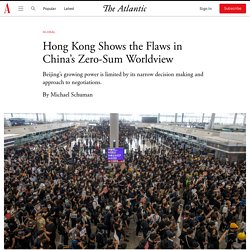
First, it throws money at the problem. Since the beginning of trade negotiations with the United States, the Chinese have tried, in essence, to buy off the Trump administration with large purchases of American agricultural, energy, and other products. Then, Beijing mixes in coercion. In response to Trump, the Chinese have imposed its own punitive duties on U.S. goods, while threatening more action. None of this has worked. Ditto in Hong Kong. China’s great global game. New study uncovers China's massive hidden lending to poor countries. Over 50 developing countries' Chinese debt accounts for on average 15 percent of their individual GDP.
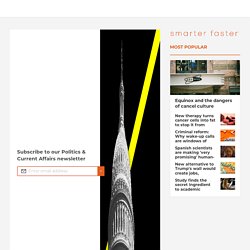
New report shows that the majority of the world's developing country's debt to China is considered "hidden. " China's loans for poor countries are primarily for crucial infrastructure. China's overseas lending, which was virtually zero before the turn of the century — well, about $500 billion in 2000 — stands today, ostensibly, at around $5 trillion. Indeed, they are now the world's largest creditor, being twice as large as both the World Bank and the International Monetary Fund, combined. How America Can Both Challenge and Coexist With China. The United States is in the midst of the most consequential rethinking of its foreign policy since the end of the Cold War.
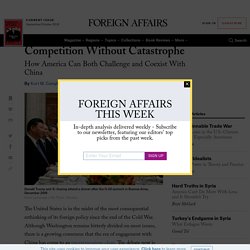
Although Washington remains bitterly divided on most issues, there is a growing consensus that the era of engagement with China has come to an unceremonious close. The debate now is over what comes next. Like many debates throughout the history of U.S. foreign policy, this one has elements of both productive innovation and destructive demagoguery. Most observers can agree that, as the Trump administration’s National Security Strategy put it in 2018, “strategic competition” should animate the United States’ approach to Beijing going forward.
But foreign policy frameworks beginning with the word “strategic” often raise more questions than they answer. The rapid coalescence of a new consensus has left these essential questions about U.S. China reportedly signs secret deal to station troops in Cambodia. China has signed a secret deal to allow its military troops to be stationed at a naval base in Cambodia, according to reports.
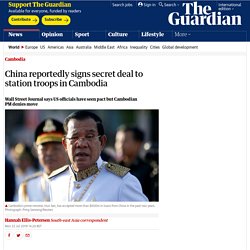
The Wall Street Journal, citing US officials who had seen a pact drawn up between the two countries, reported that the Cambodian prime minister, Hun Sen, has agreed to give China access to the Ream naval base on the Gulf of Thailand. Fears that China intended to place troops in Cambodia, giving them enhanced access to the contested South China Sea and an unprecedented economic and territorial foothold in south-east Asia, have circulated for months. The prospect of a Chinese naval base in Cambodia was first raised in a letter from the US vice-president, Mike Pence, to Hun Sen in 2018 but was repeatedly dismissed by Hun Sen as “fake news”.
After renewed reports on Sunday, the prime minister once again denied the story. “This is the worst ever made-up news against Cambodia,” he told the pro-government news site Fresh News on Monday. China’s great global game. A new study tracks the surge in Chinese loans to poor countries - Hey, big lender. LOAN TALKS with Belarus; funding for bridges in Liberia; a possible gas project in Timor-Leste; accusations of exploitation in Tanzania; a corporate dispute in India; pledges to support the Rwandan private sector.
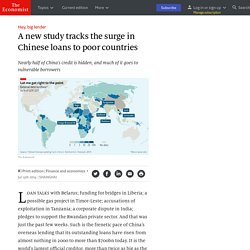
And that was just the past few weeks. Liu Cixin’s War of the Worlds. Two rival civilizations are battling for supremacy.
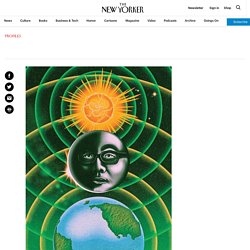
Civilization A is stronger than Civilization B and is perceived by Civilization B as a grave threat; its position, however, is more fragile than it seems. Neither side hesitates to employ espionage, subterfuge, and surveillance, because the rules of conduct—to the extent that they exist—are ill-defined and frequently contested. China is not the source of our problems. China is being made a scapegoat for rising inequality in the United States.
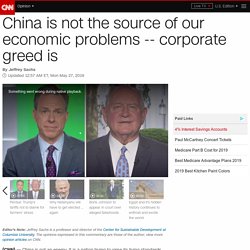
While US trade relations with China have been mutually beneficial over the years, some US workers have been left behind, notably Midwestern factory workers facing competition due to rising productivity and comparatively low (though rising) labor costs in China. Instead of blaming China for this normal phenomenon of market competition, we should be taxing the soaring corporate profits of our own multinational corporations and using the revenues to help working-class households, rebuild crumbling infrastructure, promote new job skills and invest in cutting-edge science and technology.
We should understand that China is merely trying to make up for lost time after a very long period of geopolitical setbacks and related economic failures. Here is important historical background that is useful to understand China's economic development in the past 40 years. A trade war with China won't solve our economic problems. China's Belt and Road Initiative Needs to Be Defined. In May 2017, Beijing hosted the first Belt and Road Forum for International Cooperation.
The summit, which gathered representatives of more than 100 countries, had been organized to promote Chinese President Xi Jinping’s signature foreign policy: the Belt and Road Initiative (BRI), an ambitious vision to expand Beijing’s investment and trade ties with some 65 other countries that collectively cover two-thirds of the world’s population. In his keynote speech at the summit, Xi hailed BRI as “the project of the century.”
“What we hope to create,” he said, “is a big family of harmonious coexistence.” China’s Looming Crisis: A Shrinking Population. Chinese academics recently delivered a stark warning to the country’s leaders: China is facing its most precipitous decline in population in decades, setting the stage for potential demographic, economic and even political crises in the near future. For years China’s ruling Communist Party implemented a series of policies intended to slow the growth of the world’s most populous nation, including limiting the number of children couples could have to one. The long term effects of those policies mean the country will soon enter an era of “negative growth,” or a contraction in the size of the total population.
“Later, longer, fewer” policy is promoted. One-child policy becomes constitutional. China Is Facing A “Precipitous” Population Decline. The Belt and Road Initiative Is a Corruption Bonanza. When former Malaysian Prime Minister Najib Razak was ousted from office in May 2018, it’s possible that no one was more dismayed than officials in Beijing.
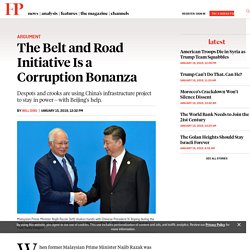
After all, Najib had granted China extraordinary access to Malaysia. Apple and China’s problems show that today’s titans may not rule the world tomorrow. Our mental geography is bounded by what has gone before.
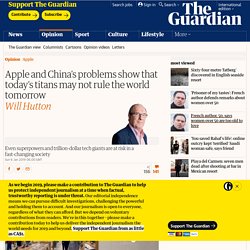
What has happened in the recently remembered past is most likely to continue. Inflection points, when trends decisively change, are more infrequent than the many instances when things go on as they have done. Inside China's audacious global propaganda campaign. As they sifted through resumes, the team recruiting for the new London hub of China’s state-run broadcaster had an enviable problem: far, far too many candidates.

Almost 6,000 people were applying for just 90 jobs “reporting the news from a Chinese perspective”. Even the simple task of reading through the heap of applications would take almost two months. For western journalists, demoralised by endless budget cuts, China Global Television Network presents an enticing prospect, offering competitive salaries to work in state-of-the-art purpose-built studios in Chiswick, west London. Sri Lanka’s Political Shake-Up Is a Win for China. On Friday, Sri Lankan President Maithripala Sirisena withdrew his United People’s Freedom Alliance from the government’s ruling coalition without warning, fired Prime Minister Ranil Wickremesinghe, and appointed former President Mahinda Rajapaksa to the post. On Saturday, he temporarily suspended Parliament, plunging the country into a constitutional crisis. Sri Lanka’s sudden political reorganization will empower the former strongman Rajapaksa, whose new party enjoyed unexpected success in the country’s February local elections and rattled the political establishment.
His resurgence means a second chance for China’s attempts to play a dominant role in the island’s politics and development, and it serves as a significant impediment to U.S. efforts for greater engagement in the Indo-Pacific. Under Rajapaksa, Sri Lanka engaged in an expensive and poorly conceived spree of infrastructure spending to stimulate growth. The Chinese century is well under way - A new hegemon. Get our daily newsletter Upgrade your inbox and get our Daily Dispatch and Editor's Picks. WHEN SCHOLARS of international relations predict that the 2000s will be a “Chinese century”, they are not being premature.
Although America remains the lone superpower, China has already replaced it as the driver of global change. There is one economic metric on which China already ranks first. Why Countries Are Turning Against China's Belt and Road. China’s Belt and Road Initiative (BRI), an enormous international investment project touted by Chinese President Xi Jinping, was supposed to establish Chinese soft power. Since late 2013, Beijing has poured nearly $700 billion worth of Chinese money into more than sixty countries (according to research by RWR Advisory), much of it in the form of large-scale infrastructure projects and loans to governments that would otherwise struggle to pay for them. The idea was to draw these countries closer to Beijing while boosting Chinese soft power abroad. Today, however, China faces a backlash to BRI at home and abroad.
How will our children lead the world? I was at LendIt China last week, or Lang Di as it should rightly be called. As readers know, I always get a buzz from visiting China, and this trip was no exception. It made me reflect in fact upon my last twenty plus years of coming here and seeing the country change. - The Washington Post. What is China's Belt and Road Initiative? Beijing’s multibillion dollar Belt and Road Initiative (BRI) has been called a Chinese Marshall Plan, a state-backed campaign for global dominance, a stimulus package for a slowing economy, and a massive marketing campaign for something that was already happening – Chinese investment around the world.
Over the five years since President Xi Jinping announced his grand plan to connect Asia, Africa and Europe, the initiative has morphed into a broad catchphrase to describe almost all aspects of Chinese engagement abroad. Belt and Road, or yi dai yi lu, is a “21st century silk road,” confusingly made up of a “belt” of overland corridors and a maritime “road” of shipping lanes. From South-east Asia to Eastern Europe and Africa, Belt and Road includes 71 countries that account for half the world’s population and a quarter of global GDP. Subscribe to read. - The Washington Post. Email Template. How the West got China wrong - Geopolitics. - The Washington Post. Is-it-time-to-worry-about-chinaagain. China’s Master Plan: A Global Military Threat. Authoritarian Advance: Responding to China’s Growing Political Influence in Europe: Global Public Policy Institute.
Report05 February 2018 by Thorsten Benner, Jan Gaspers, Mareike Ohlberg, Lucrezia Poggetti, Kristin Shi-Kupfer GPPi & MERICS. Economist. At the crossroads of the new Silk Road. Economist. The superpower that is China - Chris Skinner's blog. I grew up with America as the dream. Economist. OVER the weekend Xi Jinping welcomed 28 heads of state and government to Beijing for a coming-out party, which continues today, to celebrate the “belt and road” initiative, his most ambitious foreign policy.
Abf91928-b8ed-4e6b-8f33-6c6375d25f41?version=1. The Pacific Power Index. China’s Water Problems Are Even Worse Than You Think: Report - China Real Time Report. Playing the Long Game. China’s growth and appetite for foreign direct investment (FDI) has made Africa its largest investment destination, according to a new report written by the Economist Intelligence Unit (EIU) for leading global law firm, Mayer Brown. RHG_New Realities_29April2014.pdf. China Dream.